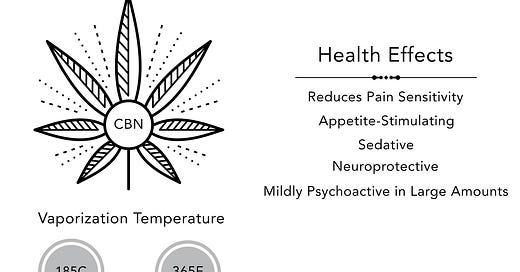This month we’re taking a deeper look at Cannabinol!
Cannabinol (CBN) was first discovered in cannabis by Thomas Barlow Wood, W.T Newton Spivey, and Thomas Easterfield in 1896. However, it wasn’t until the early 1930s that CBN’s chemical structure was identified by Robert Sidney Cahn.
Cannabinol is generated as a result of the degradation of THC when a cannabis plant is exposed to heat and oxygen. It is found in trace amounts in fresh cannabis however, its concentration increases as the plant ages or undergoes oxidation. Initially considered an inert compound, recent studies have unveiled its therapeutic properties, sparking interest among researchers and healthcare professionals.
Unlike CBD, which is entirely non-psychoactive, CBN in larger doses can produce mild psychoactive reactions.
CBN interacts with endocannabinoid (CB) receptors, but it’s also reported to interact with non-CB targets, including various ion channels. (Ion channels are integral membrane proteins that span through the cell membranes to form a pore that can be penetrated by selected ions at a rate of up to 100 million per second.) A study published in Communications Biology investigated how CBN affects sodium channels, which are important for transmitting signals in nerve cells. The study found that CBN can slow down sodium channels, making them less likely to send pain signals, a process called slow inactivation. The study also found that CBN reduces the excitability of nerve cells in the dorsal root ganglion (DRG), which are involved in transmitting pain signals. This means CBN could be particularly useful in alleviating neuropathic pain conditions.
Research published in the American Journal of Endocannabinoid Medicine in 2022 validates CBN's potential as a sleep aid. The study, conducted on 35 medical cannabis users, found that a repeat-action tablet containing 10mg of THC and 5mg of CBN improved sleep quality. During the combination tablet-use period, participants slept an average of 20 minutes longer. There was a 22% increase in reported feelings of restfulness upon awakening. There was also an 18% increase in reported overall sleep quality. These findings indicate that CBN may extend sleep duration and enhance sleep quality, presenting a natural alternative to conventional sleep medications.

In a study published in Biochimica et Biophysica Acta (BBA) - Molecular Basis of Disease in March 2022, researchers explored CBN's impact on retinal ganglion cell protection and its modulation of intraocular pressure (IOP), crucial factors in glaucoma. Utilizing both laboratory and animal models, the study investigated how CBN affects the levels of extracellular matrix (ECM) proteins associated with glaucoma. The findings revealed that CBN effectively promotes neuroprotection, counteracts alterations in ECM protein levels, and normalizes intraocular pressure. These findings indicate a promising therapeutic potential for CBN as an intervention for patients with glaucoma
A study published in April 2012 in Psychopharmacology was the first to demonstrate CBN’s ability to enhance feeding behaviour in rats. The study proved CBN increases appetitive behaviours through a mechanism involving CB(1) receptors, leading to quicker initiation of feeding and increased consumption. Specifically, it enhanced the size and duration of the first meal and overall intake during the test period. Conversely, CBN reduced total food consumption throughout the test duration indicating more research to better understand the underlying mechanisms and behavioural effects of CBN, particularly concerning its potential anti-obesity properties is needed.
If you’re looking for medicinal products on the Australian market that are high in CBN**…
Humacology 2:225:25 Full Spectrum CBD+CBN "PINK" Oil (Total CBN 25mg/ml)
Heyday Innovative Night THC/CBN Gummies (Total CBN 10mg/each)
Entoura’s EMC 10:15 Oil (Total CBN 0.5mg/ml)
Botanitech’s T10:C15 Oil (Total CBN 0.31mg/ml)
Botanitech T25:C25 Oil (Total CBN 0.3mg/ml)
This substack aims to provide anecdotal information from my personal experiences in hopes it will lead to meaningful conversations between my readers and their healthcare professionals about medicinal cannabis.
I have no formal training in medicine or science. This article does not constitute medical advice.





How bioavailable is CBN orally? I’m wondering how the gummies are as I forgot they existed! Very interested in CBN :)